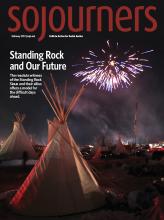FIVE HUNDRED YEARS after Martin Luther’s charge semper reformanda (“always reforming”), we stand on the precipice of climate disaster.
In Marrakesh, Morocco, people of faith met at the 2016 U.N. Climate Change conference (COP22) to face an impending climate disaster—a disaster that now seems likely to be exacerbated by U.S. political leadership rather than mitigated by it.
The World Council of Churches held an event in Marrakesh to emphasize how transitional justice- and rights-based approaches, alongside faith-based moral perspectives, can address challenges as complex as natural-resource management and ecological, humanitarian, and spiritual crises exacerbated by climate change. WCC organizer Henrik Grape hoped that “COP22 will take steps forward to fulfill the expectations from Paris and that nations will raise their ambitions to keep the temperature [rise] well under 2 degrees Celsius.”
A wide variety of church bodies were represented at the gathering. The Lutheran World Federation brought youth delegates from Africa to Marrakesh to promote intergenerational collaboration and solidarity with people most affected by climate change. “One of our thematic approaches to the commemoration of 500 years of Lutheran Reformation is the theme ‘Creation: Not For Sale,’” said Caroline Bader, youth secretary for the federation. The Act Alliance, a coalition of 143 churches and parachurch organizations, established a gender-climate change working group to address sustainability among poor and marginalized people through a gender lens.
Catholic theologian Guillermo Kerber believes that Pope Francis’ encyclical on the environment is a turning point for the social doctrine of the Catholic Church, by including ecology in the social concerns of Catholics. “The celebration of the 500 years of the Reformation should be an opportunity to express an ecological conversion of all Christian denominations,” said Kerber.
Read the Full Article

